 This blog post was written by NCTE member Jessica Dao as part of a blog series celebrating the National Day on Writing®. To draw attention to the remarkable variety of writing we engage in and to help make all writers aware of their craft, the National Council of Teachers of English has established October 20 as the National Day on Writing®. Resources, strategies, and inclusion in a blog post does not imply endorsement or promotion by NCTE.
This blog post was written by NCTE member Jessica Dao as part of a blog series celebrating the National Day on Writing®. To draw attention to the remarkable variety of writing we engage in and to help make all writers aware of their craft, the National Council of Teachers of English has established October 20 as the National Day on Writing®. Resources, strategies, and inclusion in a blog post does not imply endorsement or promotion by NCTE.
The Most Important Thing to Learn in Fourth-Grade Writing
What is the most crucial aspect of fourth-grade writing? While opinions may vary, I believe teaching my students to produce at least one page of clear and coherent writing in a single sitting is essential. This is no easy task; it requires a combination of organization skills, revising and editing practices, and the development of descriptive language. As I embark on a new school year, I’ve decided to use letter writing as a teaching tool.
My inspiration stems from a course at the University of Texas at Austin, where Dr. Tracey Flores encouraged us to be “pen pals” with her. This weekly exercise helped me build a connection with her and made me comfortable writing in an academic setting. I want my students to achieve similar comfort while overcoming the insecurities they might have about writing. Many of them express feelings like “writing is hard,” “I don’t know where to begin,” or “Is this good enough?” Additionally, I aim to help them meet personal writing goals, such as using correct grammar, incorporating higher-level vocabulary, writing in paragraphs, and enhancing clarity. Understanding these goals allows me to provide targeted support through modeling and consistent practice.
During the first week of school, I had my students create blue folders filled with scratch paper. I wrote a letter to the entire class sharing what I did over the summer, what to expect in fourth grade, and a funny personal story. This exercise aimed to break the ice and encourage students to share their own experiences about their summers and their feelings about the upcoming year.
Challenges and Solutions
Letter writing has its challenges, but I have found ways to address them. For instance, some students struggle to ask follow-up questions or repeat what they’ve already said. I connected this challenge to our morning meeting discussions about holding conversations. I explained, “To show someone you’re listening, acknowledge or compliment something they said and ask related questions. The same can be applied when responding to a letter.”
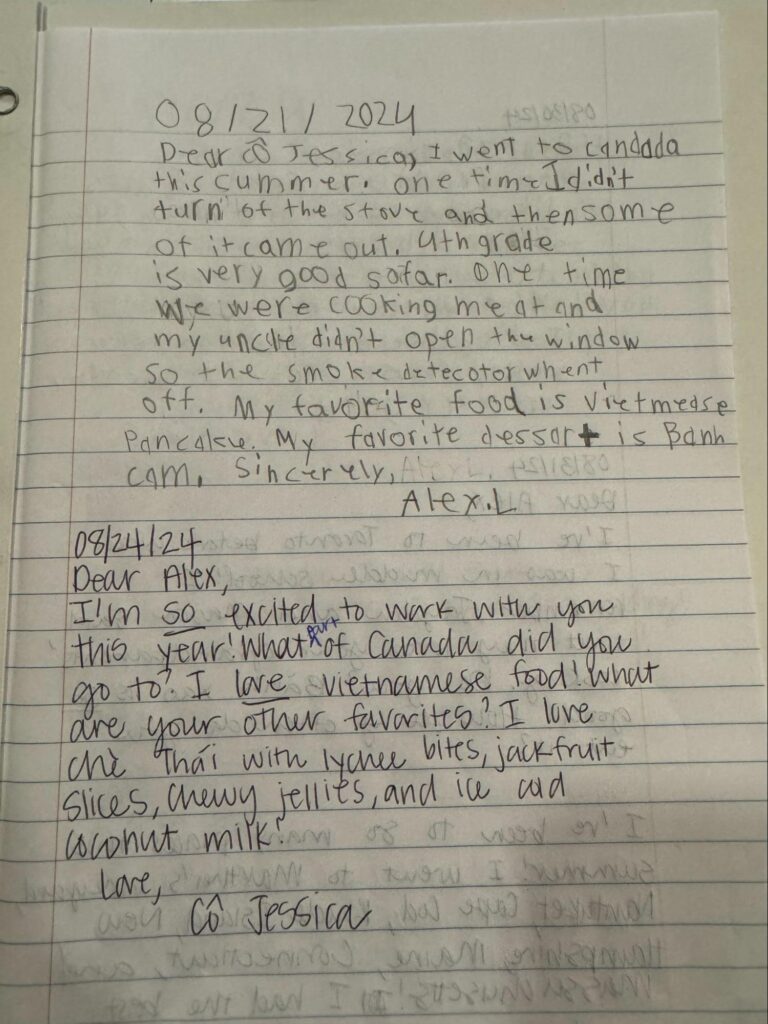
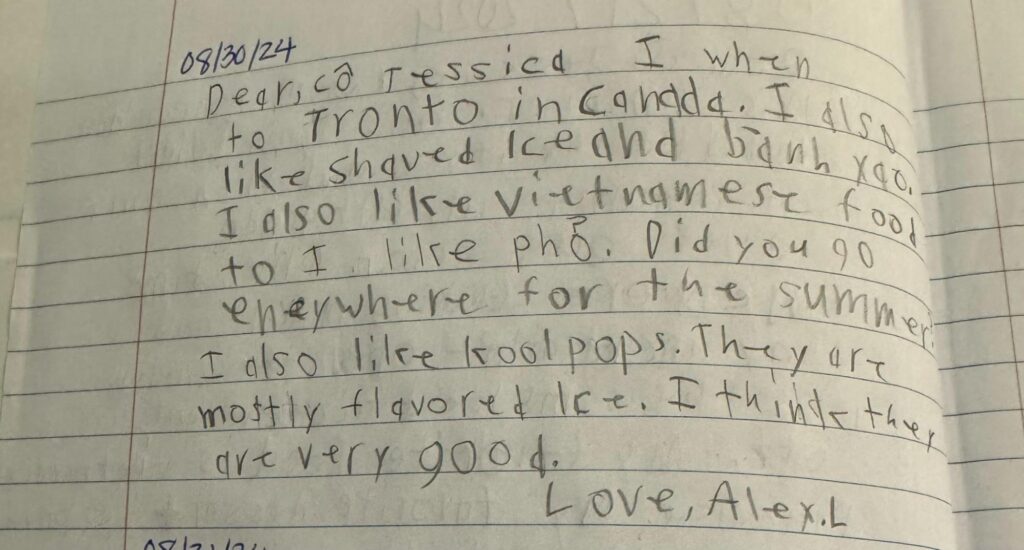
After having our discussion on maintaining the conversation, and modeling for the student how to ask follow-up questions,
the student starts implementing follow up questions into his own writing.
Another challenge arose when some students only wrote a sentence or two. I encouraged them to elaborate by adding sensory details and descriptive language. As students shared their letters, they noticed my responses became longer as I engaged with each topic they brought up. This motivated them to write more.
Not all students could respond weekly, and I reassured them that this was perfectly okay. I emphasized that our activity was not graded, but rather an opportunity for me to get to know them and for them to practice writing. I wanted to avoid creating an obligation that might make writing feel burdensome or lead to burnout, especially alongside graded assignments.
Insights Gained
Through this letter-writing experience, I have learned valuable lessons about my students’ writing abilities. Many students can write extensively about a topic; for instance, one student wrote about their summer vacation over multiple letters, while another discussed their favorite movie. My follow-up questions helped expand their thinking and encouraged them to write more.
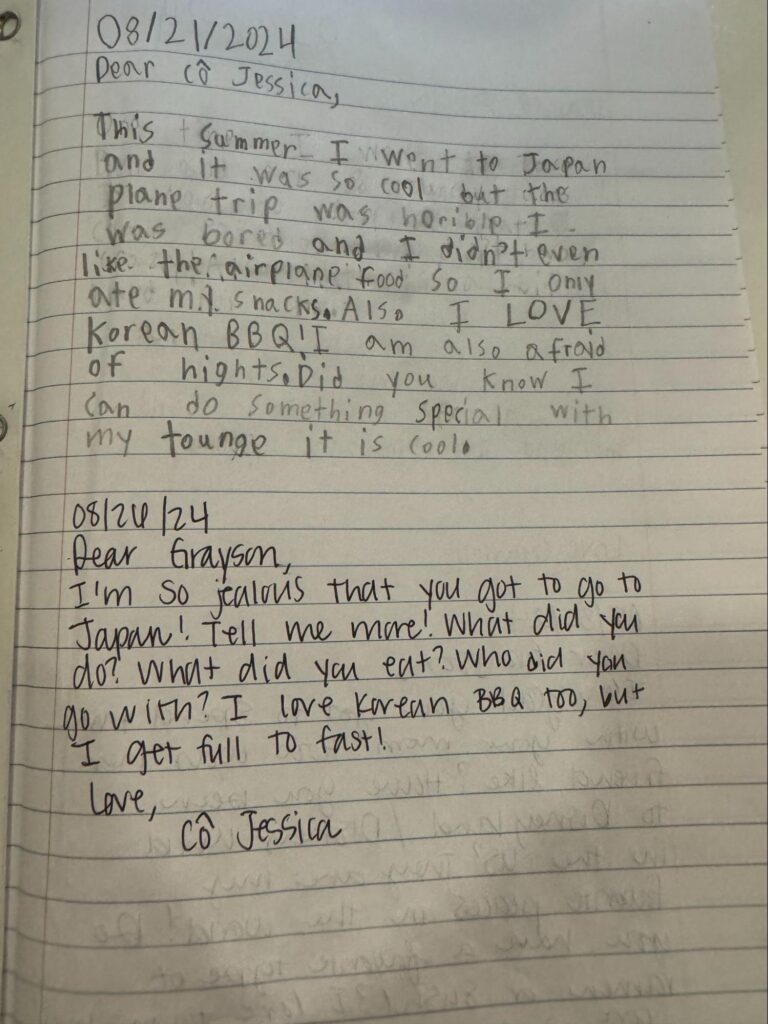
Student writes about their summer trip to Japan over multiple letters.
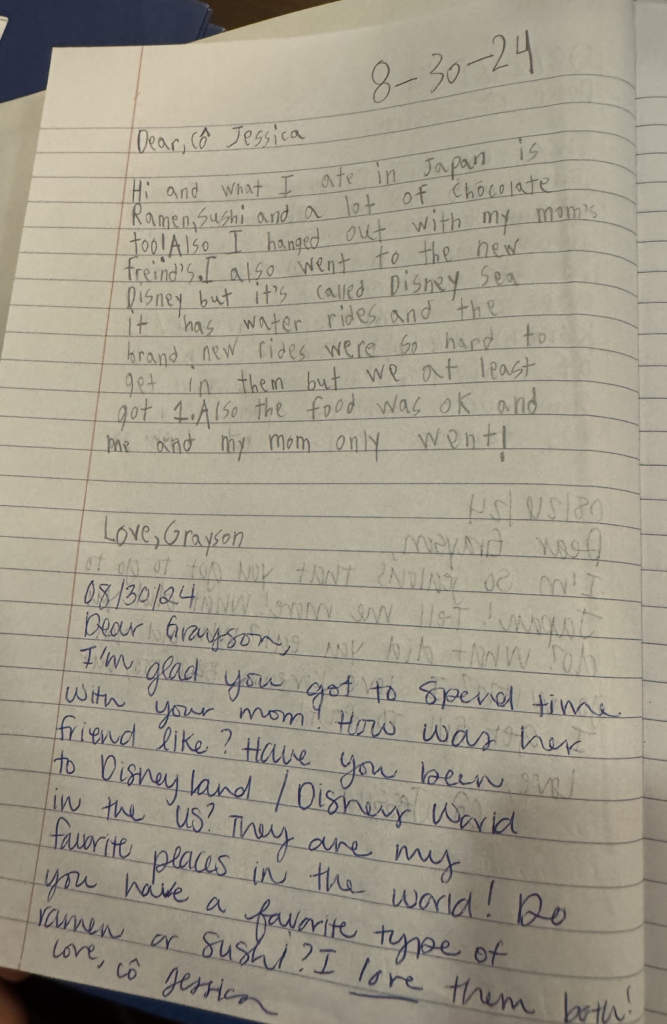
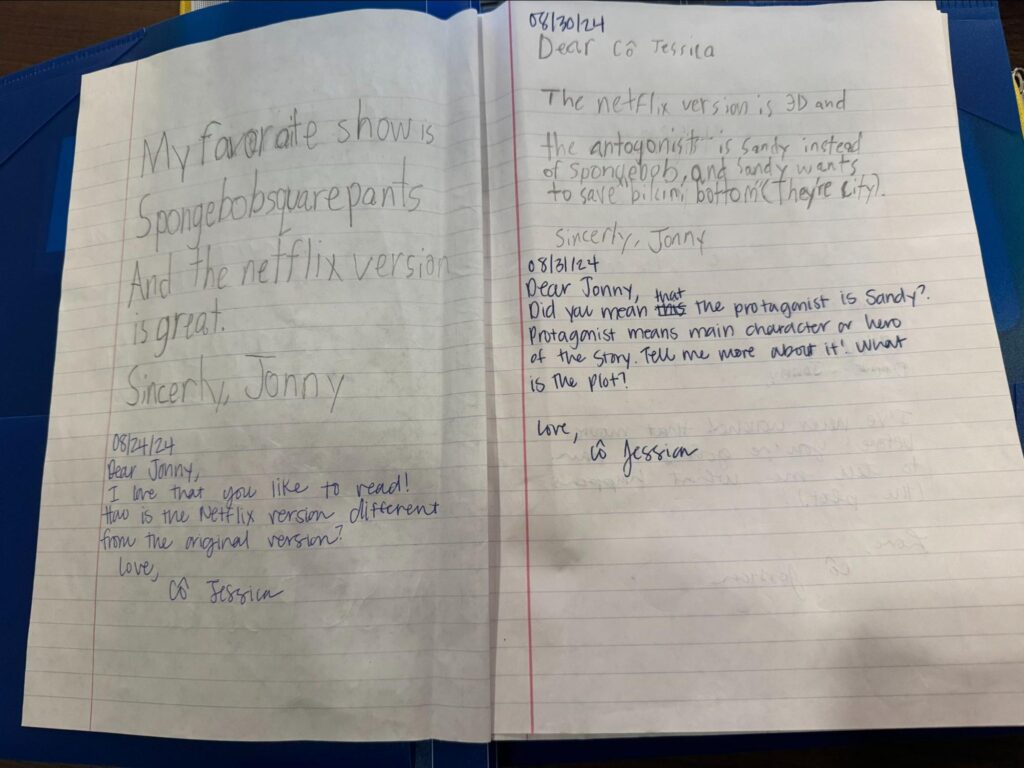
Student writes about his favorite movie. I aided him with providing more details and encouraging him to use content vocabulary into his writing.
I have also observed that students’ writing length increases over time. As I learn more about them, they become more comfortable sharing, which, in turn, fosters greater confidence in their writing. Despite the time it takes to respond to each letter, the relationships I build with my students are incredibly rewarding. I often spend an hour or two on weekends crafting thoughtful replies, but the connection I establish with them makes it worthwhile.
As students develop their identities, they also cultivate their writing identities. For example, one student used translanguaging where she included both Vietnamese, her home language, and English as a way to honor her cultural heritage. Another student listed out and described his favorite Vietnamese dishes instead of writing the translated version. Another emergent bilingual student and I practice writing together: she writes in English while I write in Vietnamese. We use translators to aid our communication, allowing us both to connect through our respective languages.
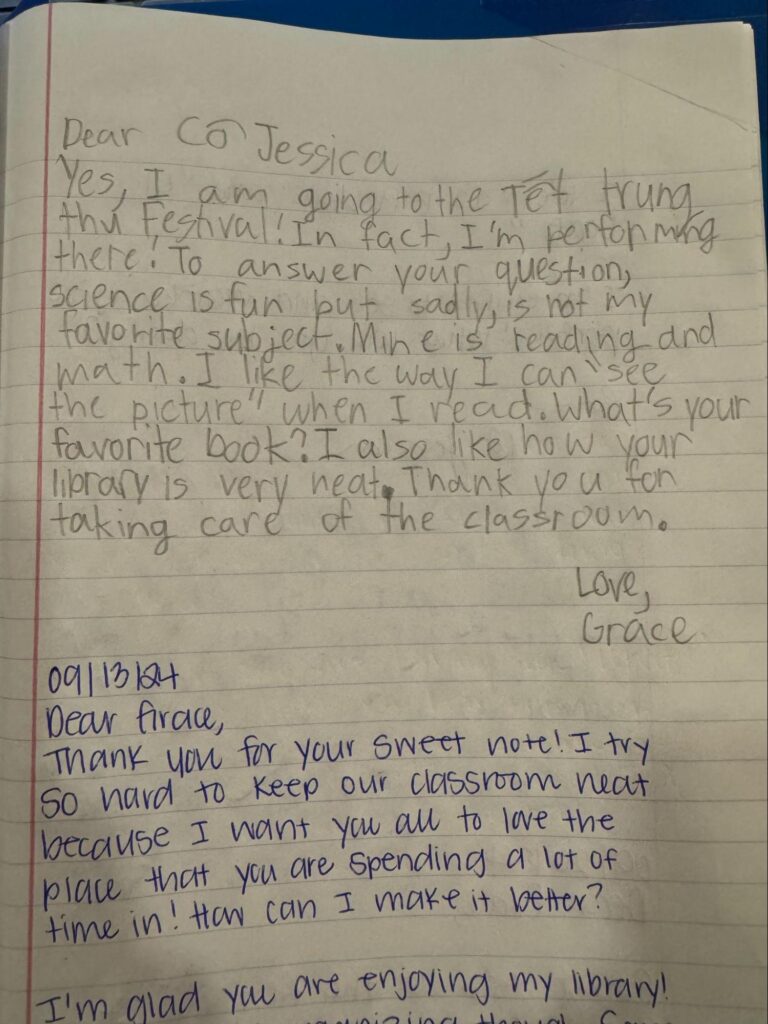
Students writing “Tết Trung Thu” instead of “Mid-Autumn Festival.”
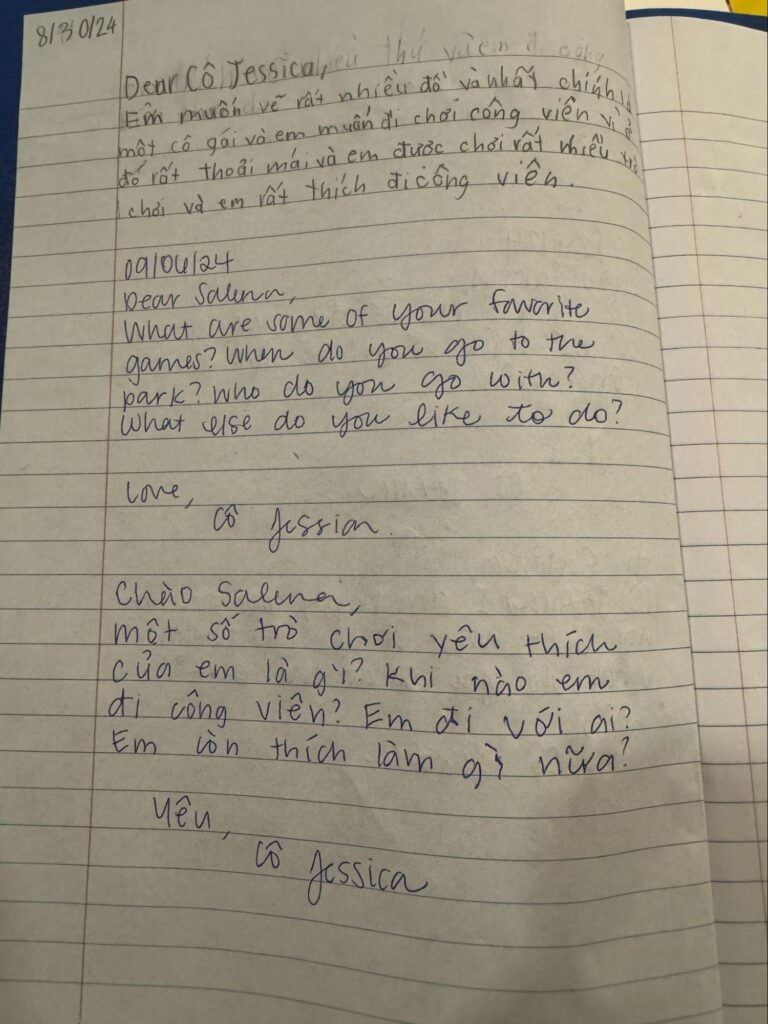
Student and I writing in our preferred language. Afterward, I wrote out the translated version in the students’ preferred language.
Conclusion
During the seventh week of school, I asked my students, “Do you think writing letters to your teacher has helped improve your writing?” Here are some of their responses:
“Yes, because I’m practicing using descriptive details in my writing.”
“Yes, because it encourages me to want to write even more.”
“Yes, because I used to write sentences that made no sense.”
This is my first year implementing this letter-writing initiative in my fourth-grade classroom, and it has been a learning process. I recognize the importance of establishing authentic relationships and fostering growth over time. I’m excited to see how my students respond to this approach and look forward to reflecting with them on their progress as writers by the end of the year. My hope is that they will view themselves as capable writers, making strides toward their goals and gaining confidence in their abilities.
 Jessica Dao, a native of Dallas, Texas, holds a degree in early childhood education, English as a second language generalist, and a minor in educational psychology from the University of Texas at Austin. Currently an educator in the Austin Independent School District, her teaching philosophy emphasizes the creation of a student-centered, culturally responsive learning environment. She values authentic relationships to incorporate identities and interests into the curriculum, while also encouraging critical thinking about issues of inequity. You can reach her via email at Jessicadao@utexas.edu.
Jessica Dao, a native of Dallas, Texas, holds a degree in early childhood education, English as a second language generalist, and a minor in educational psychology from the University of Texas at Austin. Currently an educator in the Austin Independent School District, her teaching philosophy emphasizes the creation of a student-centered, culturally responsive learning environment. She values authentic relationships to incorporate identities and interests into the curriculum, while also encouraging critical thinking about issues of inequity. You can reach her via email at Jessicadao@utexas.edu.
It is the policy of NCTE in all publications, including the Literacy & NCTE blog, to provide a forum for the open discussion of ideas concerning the content and the teaching of English and the language arts. Publicity accorded to any particular point of view does not imply endorsement by the Executive Committee, the Board of Directors, the staff, or the membership at large, except in announcements of policy, where such endorsement is clearly specified.

